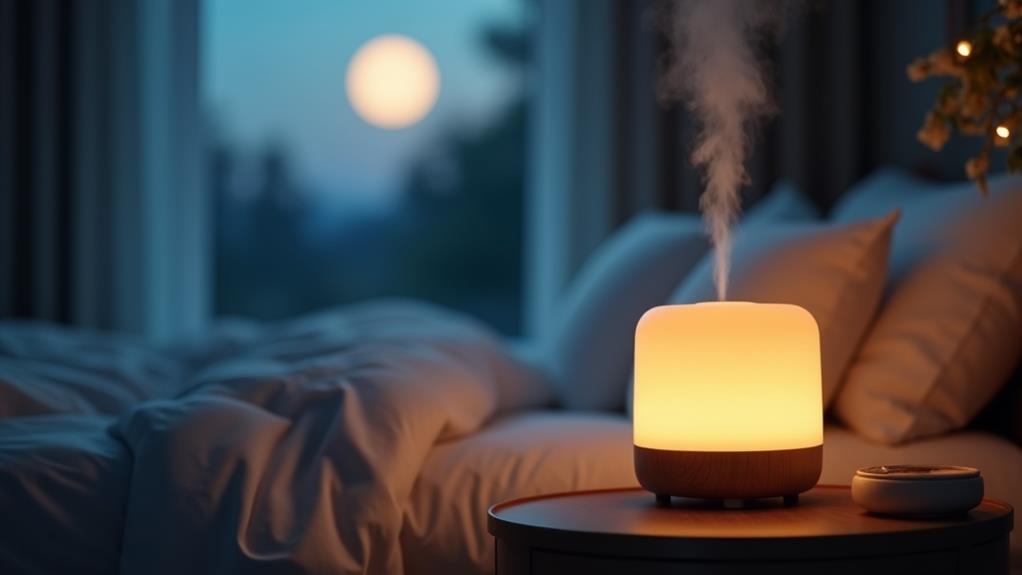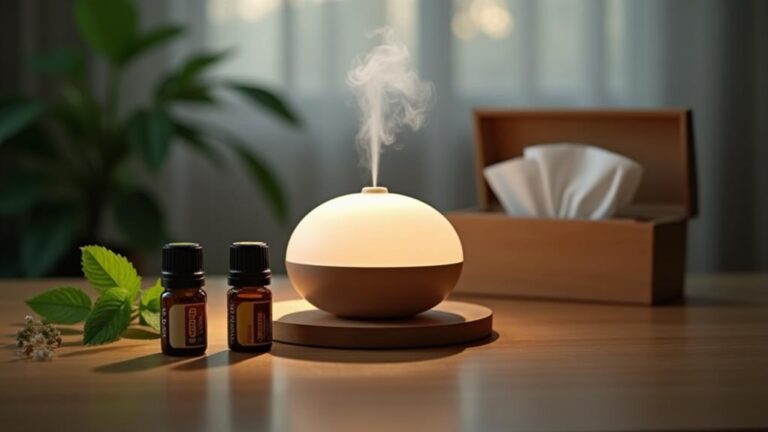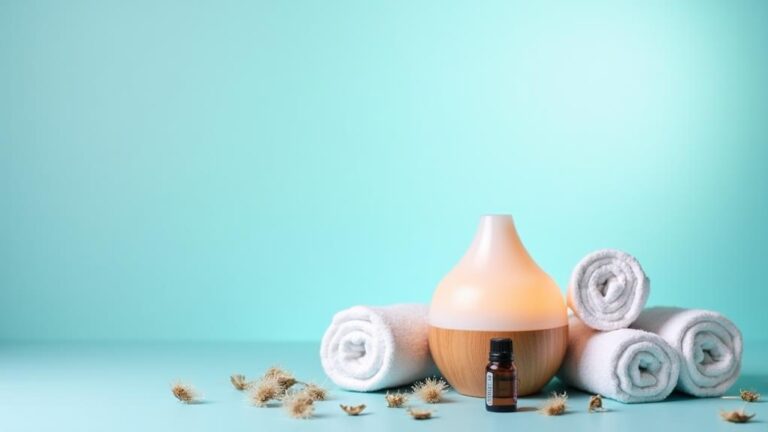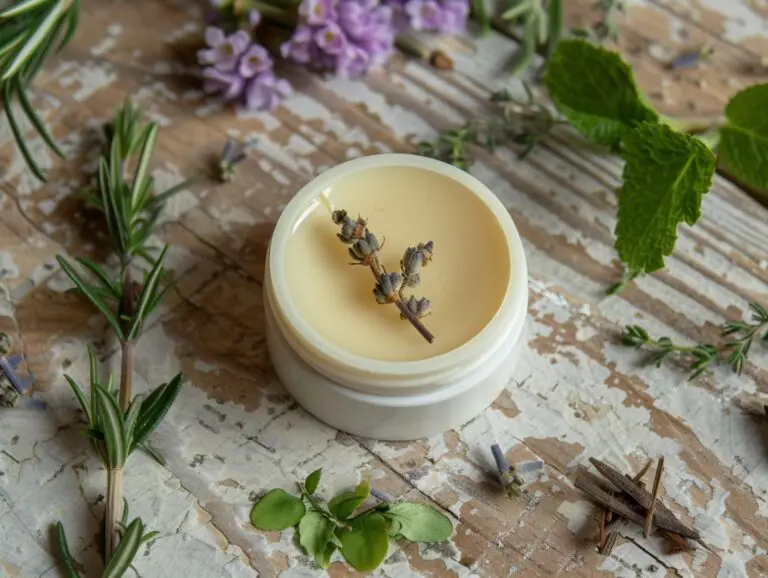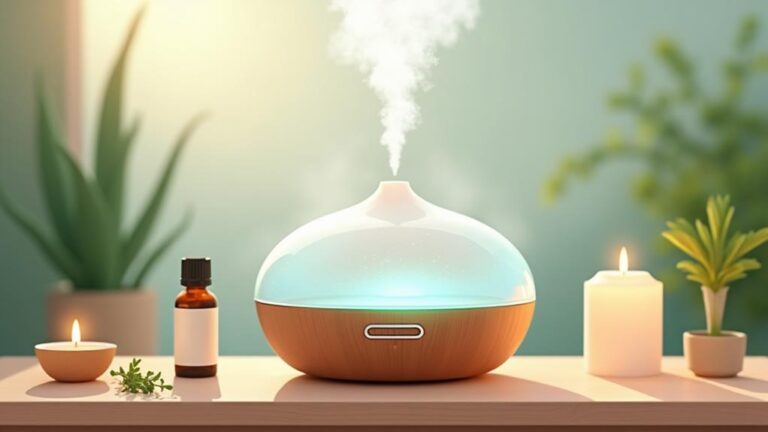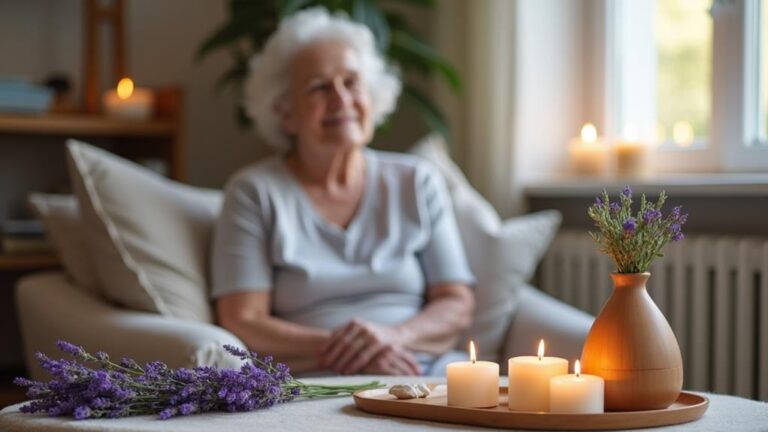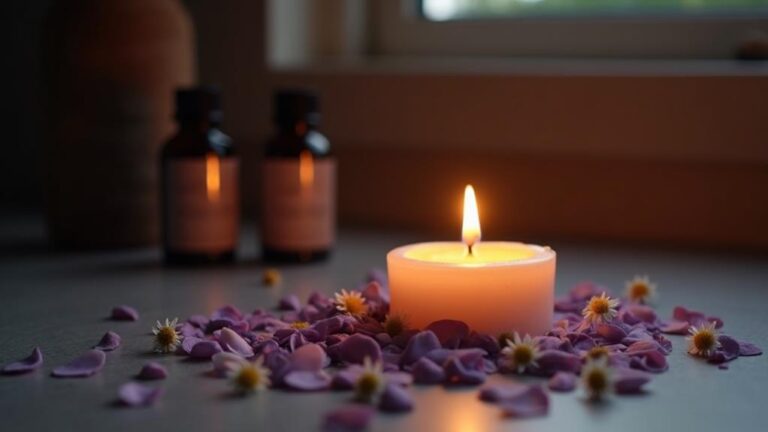About 70 million Americans suffer from sleep disorders, and many are turning to alternative solutions for restful sleep. You're likely one of them, searching for a natural and effective way to improve your sleep quality. Aromatherapy diffusers have gained popularity in recent years, and for good reason – they can create a sleep-conducive atmosphere that promotes relaxation and calms the mind. But what exactly makes these diffusers so effective, and how can you choose the right one for your needs? It's worth exploring the benefits and features of aromatherapy diffusers to see if they can be the key to accessing a restful night's sleep for you.
Key Takeaways
- Aromatherapy diffusers promote relaxation and reduce stress, helping to alleviate symptoms of insomnia and sleep disorders.
- Certain calming essential oils, such as lavender and chamomile, can be used in diffusers to promote relaxation and reduce anxiety.
- Placing an aromatherapy diffuser on a stable and heat-resistant surface, away from flammable materials, ensures safe use.
- Ultrasonic diffusers are ideal for bedrooms due to their silent operation and ability to create a fine mist.
- Aromatherapy diffusers can be paired with soothing color schemes and a peaceful room temperature to create a sleep-conducive environment.
Choosing the Right Diffuser
When selecting an aromatherapy diffuser to promote restful sleep, consider the type of device that will work best for you and your sleep space. Think about the size of your bedroom and the diffuser's coverage area to guarantee it can effectively fill the space with a soothing aroma.
Diffuser Placement Options are also vital; choose a device that can be placed in a convenient location, such as a bedside table or a shelf, without obstructing your movement or creating a tripping hazard.
Noise Level Considerations are also essential, as some diffusers can be quite loud. If you're a light sleeper, look for a device with a silent or whisper-quiet operation.
Ultrasonic diffusers, for example, use high-frequency sound waves to create a fine mist, often without making a sound. On the other hand, nebulizing diffusers can be noisier, but some models come with adjustable volume controls or silent modes. By considering these factors, you can find the perfect aromatherapy diffuser to promote a restful and rejuvenating sleep experience.
Benefits of Aromatherapy Diffusers
With an aromatherapy diffuser by your side, you can access a wealth of benefits that can drastically improve the quality of your sleep.
By incorporating an aromatherapy diffuser into your bedtime routine, you can experience a deeper sense of relaxation, reduced stress, and anxiety, and even alleviate symptoms of insomnia.
Some of the most significant benefits of using an aromatherapy diffuser for sleep include:
- Promoting a sense of calm and relaxation, allowing you to fall asleep faster and sleep more soundly
- Reducing symptoms of anxiety and depression, which are common underlying causes of sleep disorders
- Providing therapeutic benefits that can help alleviate physical pain and discomfort, making it easier to fall asleep and stay asleep
Essential Oils for Sleep
You're likely wondering which essential oils can help you unwind and prepare for a restful night's sleep.
Certain calming essential oils, such as lavender and chamomile, are known for promoting relaxation and reducing anxiety.
Promoting Relaxation
Certain essential oils have a profound impact on your sleep quality, and using them in aromatherapy diffusers can be a game-changer for a restful night's sleep.
By incorporating these oils into your bedtime routine, you can create a serene ambiance that sets the tone for a peaceful slumber.
To promote relaxation, try the following:
- Practice mindful meditation before bed, focusing on your breath and quieting your mind. This helps to calm your nervous system and prepares your body for sleep.
- Create a sleep-conducive environment by dimming the lights, keeping the room cool, and using a comfortable mattress and pillows.
- Use your aromatherapy diffuser to release a soothing blend of essential oils into the air, such as lavender or chamomile, which are known for their calming effects.
Calming Essential Oils
As you create a sleep-conducive environment, the right blend of calming essential oils can further enhance the ambiance, quieting your mind and soothing your body. Certain essential oils possess therapeutic properties that can calm your nervous system, slow down your heart rate, and prepare your body for a restful night's sleep.
When choosing essential oils for sleep, it's crucial to weigh oil interactions. Some oils can be overpowering, while others complement each other perfectly.
Lavender oil, for instance, is known for its calming effects and can be blended with bergamot oil to reduce anxiety. Meanwhile, vetiver oil can promote relaxation and be paired with sandalwood oil to create a grounding and calming atmosphere.
Other calming essential oils you can ponder include ylang-ylang, clary sage, and Roman chamomile. These oils can help reduce stress and anxiety, making it easier to fall asleep and stay asleep. By combining the right essential oils and understanding their interactions, you can create a personalized blend that promotes a restful and rejuvenating sleep.
How Aromatherapy Diffusers Work
When you use an aromatherapy diffuser, you're harnessing the power of essential oils to promote relaxation and restful sleep.
The diffuser works by releasing microscopic particles of the oil into the air, which you then breathe in, allowing the therapeutic benefits to take effect.
As you'll soon see, the right combination of essential oils and a gentle diffusion process can make all the difference in achieving a peaceful night's sleep.
Essential Oils Used
Beyond the soothing hum of an aromatherapy diffuser lies a potent blend of essential oils, carefully crafted to induce a restful night's sleep.
You're probably wondering what makes these oils so special.
As you explore the world of aromatherapy, you'll discover that essential oils are the heart of the experience.
Each oil is extracted from plants, flowers, or herbs, and they're chosen for their unique fragrance and chemistry.
When you use an aromatherapy diffuser, you're not just enjoying a pleasant scent – you're harnessing the therapeutic properties of these oils.
Some essential oils are better suited for sleep than others.
- Lavender oil: Known for its calming effects, lavender oil can help quiet your mind and relax your body.
- Chamomile oil: With its soothing aroma, chamomile oil can reduce anxiety and promote a sense of tranquility.
- Bergamot oil: This citrus-based oil has a calming effect on the nervous system, making it easier to drift off to sleep.
Remember to always choose high-quality oils and follow the manufacturer's guidelines to guarantee a safe and enjoyable experience.
If you have allergies or sensitivities, be sure to patch test new oils before using them in your diffuser.
Diffusion Process Explained
How does an aromatherapy diffuser actually work its magic to promote restful sleep? It's quite fascinating, really!
When you add a few drops of your chosen essential oil to the diffuser, it starts to break down the oil particles into tiny molecules.
These molecules are then released into the air as a fine mist, creating a gentle, soothing atmosphere that envelops you in relaxation.
As the mist spreads, it evenly distributes the scent throughout your space, providing a consistent and calming aroma.
This scent distribution is key to promoting relaxation and reducing stress, allowing your mind and body to unwind and prepare for a restful night's sleep.
The diffuser's gentle hum and soft glow can also contribute to a calming ambiance, further enhancing the sleep-conducive environment.
Types of Aromatherapy Diffusers
You're spoiled for choice when it comes to aromatherapy diffusers, with various types catering to different needs and preferences.
From compact portable options to stylish designs, there's a diffuser to suit your lifestyle and personal taste.
- Ultrasonic diffusers: These popular models use high-frequency sound waves to create a fine mist, making them ideal for small to medium-sized rooms.
- Nebulizing diffusers: These powerful devices use a jet of compressed air to break up essential oils into tiny particles, releasing a potent aroma that can fill larger spaces.
- Heat-based diffusers: These classic models use a gentle warmth to release the fragrance of your chosen essential oils, often featuring a soft glow or calming ambiance.
When choosing an aromatherapy diffuser, consider the materials used in its construction.
Some diffusers feature natural materials like wood or bamboo, while others are made from plastic or glass.
Portable options are perfect for travel or small spaces, while larger models can provide a more immersive experience.
Best Oils for Insomnia Relief
Essential oils can be a powerful tool in your quest for restful sleep, and some blends are more effective than others at calming your mind and soothing your body.
When it comes to insomnia relief, you'll want to focus on essential oils that target common sleep triggers, such as stress, anxiety, and restlessness.
Lavender oil is a popular choice, known for its calming and relaxing properties. It can help slow down your heart rate, lower your blood pressure, and quiet your mind, making it easier to drift off to sleep.
Bergamot oil is another effective option, as it has a calming effect on the nervous system, reducing anxiety and stress. You can also try valerian root oil, which has a sedative effect and can help regulate your sleep patterns.
When blending essential oils for insomnia relief, look for combinations that promote relaxation and calmness.
Some popular essential blends include "Sleep Serenity" or "Tranquil Dreams," which often feature a mix of lavender, chamomile, and valerian root oils.
Experiment with different blends to find what works best for you, and remember to always dilute your essential oils with a carrier oil and use them in moderation.
Creating a Sleep-Conducive Atmosphere
As you prepare for a restful night's sleep, you're creating an atmosphere that's calming, soothing, and peaceful.
You'll want to choose calming essential oils, like lavender and chamomile, to promote relaxation and reduce stress.
Additionally, you'll want to ponder soothing color schemes and a peaceful room temperature to create a sleep-conducive environment that nurtures your body and mind.
Calming Essential Oils
A peaceful sanctuary awaits in the comfort of your own bedroom, where calming essential oils can work their magic to create a sleep-conducive atmosphere.
As you prepare for a restful night's sleep, you can harness the power of aromatherapy to calm your mind and body.
- Lavender oil, known for its calming properties, can be blended with other soothing scents like chamomile and bergamot to create a calming blend that promotes relaxation.
- Scented pillows infused with calming essential oils can be a gentle reminder to unwind and let go of the day's stress.
- You can also experiment with different calming essential oils like ylang-ylang, clary sage, and vetiver to find the perfect blend that works for you.
Soothing Color Schemes
By the time the lights dim and the stars appear outside your window, your bedroom transforms into a tranquil retreat, where soothing color schemes play a vital role in creating a sleep-conducive atmosphere.
You've probably noticed that certain colors can evoke feelings of relaxation and calmness, making it easier to drift off to sleep. Calming hues like soft blues, pale greens, and mauves are known to promote relaxation and reduce stress.
These gentle shades can be incorporated into your bedroom through walls, bedding, or accent pieces, creating a sense of serenity.
Soft pastels, in particular, are excellent for promoting relaxation. Shades like lavender, peach, and powder pink can add a touch of warmth and coziness to your bedroom, making it feel like a haven.
You can also experiment with different shades of white, such as creamy whites or soft grays, to create a calming ambiance. Remember, the key is to create a space that feels peaceful and calming, allowing you to unwind and prepare for a restful night's sleep.
Peaceful Room Temperature
Beyond the domain of soothing color schemes, peaceful room temperature plays a crucial role in crafting a sleep-conducive atmosphere.
You see, a comfortable temperature can make all the difference in drifting off to dreamland.
When it comes to creating an ideal sleeping environment, you'll want to aim for a temperature between 60°F and 67°F (15°C and 19°C).
This range allows your body to relax and prepares it for a restful night's sleep.
- Invest in a cooling system, such as a ceiling fan or air conditioner, to maintain a consistent temperature throughout the night.
- Use warm lighting, like table lamps or floor lamps, to create a cozy ambiance without overheating the room.
- Consider using a smart thermostat to automatically adjust the temperature to your desired setting, ensuring a restful night's sleep.
Relaxing Aromas for Better Sleep
Frequently, when you're struggling to fall asleep, your mind is racing with thoughts and worries, making it impossible to relax. That's where aromatherapy comes in – specifically, relaxing aromas that can calm your mind and body, promoting a restful night's sleep. According to aromas research, certain scents have a profound impact on our brain's limbic system, which regulates emotions and sleep patterns.
When it comes to scent preferences, you may find that you're drawn to calming, floral notes like lavender or chamomile.
These gentle aromas can slow down your heart rate, lower your blood pressure, and quiet your mind. On the other hand, you might prefer earthier, woody scents like cedarwood or bergamot, which can help reduce anxiety and stress.
Experiment with different essential oils to find the perfect blend that resonates with you. By incorporating these relaxing aromas into your bedtime routine, you can finally quiet your mind and drift off to a peaceful slumber.
Safety Precautions to Consider
[TEXT]:
Your aromatherapy diffuser can be a haven for restful sleep, but it's crucial to think about the potential risks associated with its use.
When you're using an aromatherapy diffuser, you're working with electricity and water, which can be a hazardous combination if you're not careful.
To minimize the risks, consider the following safety precautions:
- Keep the diffuser out of reach of children and pets to avoid accidental knocks or spills that can lead to electrical shock or burn risk.
- Place the diffuser on a stable and heat-resistant surface, away from flammable materials like curtains or bedding, to prevent fires.
- Unplug the diffuser when not in use to prevent overheating, electrical shock, or other accidents.
Aromatherapy Diffuser Maintenance Tips
Properly maintaining your aromatherapy diffuser is crucial to guarantee it continues to promote restful sleep and overall well-being.
Regular cleaning and upkeep will guarantee your diffuser remains effective and hygienic. Start by reading the manufacturer's instructions for specific maintenance recommendations, as different models may have unique requirements.
To keep your diffuser clean, remove any residual oils and water after each use.
You can also perform a diffuser sanitizing by filling it with a mixture of water and white vinegar, then letting it run for a few minutes. This will help eliminate any bacteria or mineral buildup.
Additionally, check your diffuser's filter regularly and replace it when necessary.
Filter replacement is essential to prevent the growth of mold and bacteria, which can negatively impact your health. Replace the filter every 1-3 months, depending on usage.
By following these maintenance tips, you'll be able to enjoy the benefits of your aromatherapy diffuser for a long time, promoting restful sleep and overall wellness.
Regular maintenance will also help extend the lifespan of your diffuser, making it a worthwhile investment in your health.
Frequently Asked Questions
Can I Use Tap Water in My Aromatherapy Diffuser?
When using any type of device that involves water, you'll want to weigh the water quality to avoid mineral buildup. For ideal results, you might prefer using filtered or distilled water in your aromatherapy diffuser.
Are Aromatherapy Diffusers Safe for Pets and Children?
As you create a harmonious home, you wonder if your furry friends and little ones are safe around aromatherapy diffusers. Be cautious: pet toxicity and child sensitivity can occur, so choose pet-friendly oils and keep diffusers out of reach.
Do I Need to Turn off My Diffuser When I Sleep?
When using any device at night, you'll want to take into account safety and efficiency. You don't necessarily need to turn off your diffuser, thanks to convenient features like diffuser timer settings and automatic shut off.
Can I Use Multiple Essential Oils in One Diffuser?
You mix, match, and experiment with different scents, creating harmony in your space. Using multiple oils in one diffuser can be beneficial, but master oil combinations and blending techniques to avoid overpowering your senses.
How Often Should I Clean My Aromatherapy Diffuser?
You'll want to clean your diffuser regularly to guarantee peak performance. For diffuser maintenance, clean it every 3-7 uses, or when you notice buildup. This frequency helps prevent bacterial growth and keeps your air fresh.
Conclusion
You'll be sleeping like a baby in no time with an aromatherapy diffuser by your side. By creating a peaceful sanctuary, these devices can work wonders for your sleep. With thousands of restful nights ahead of you, it's worth finding the perfect diffuser and essential oils. As you drift off to dreamland, you'll wake up feeling refreshed, renewed, and ready to take on the world.


